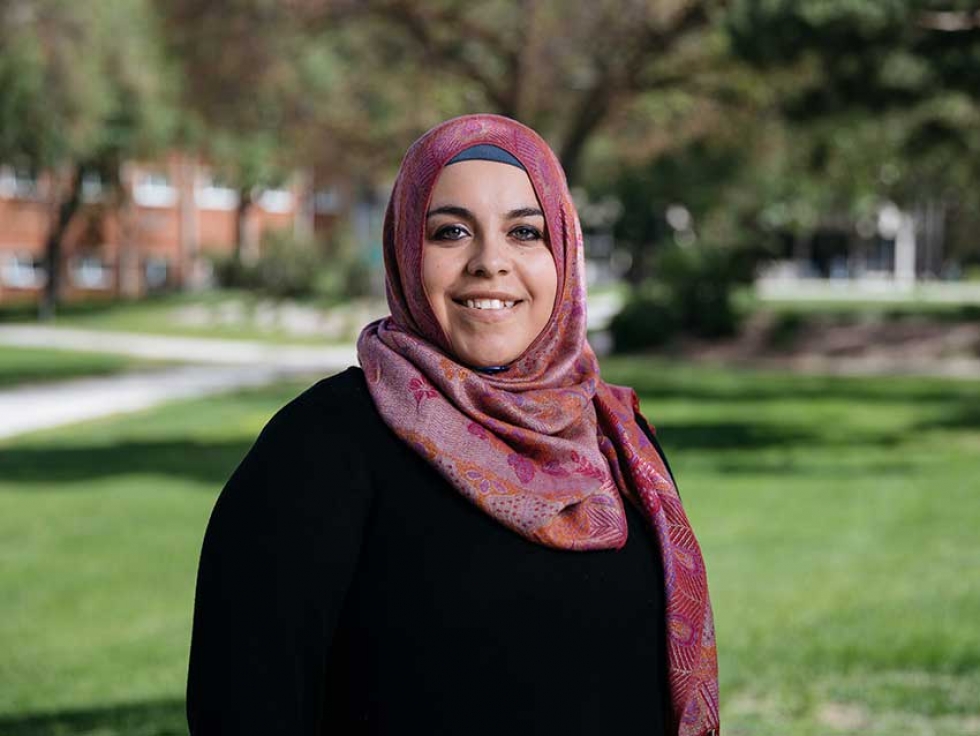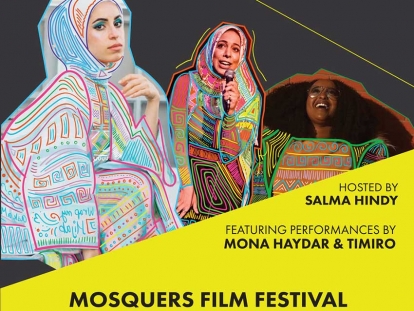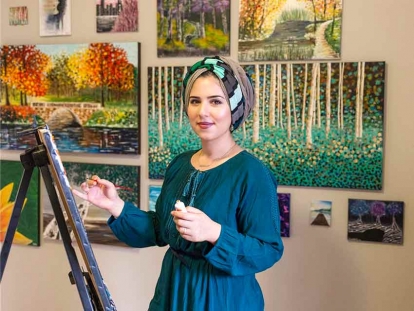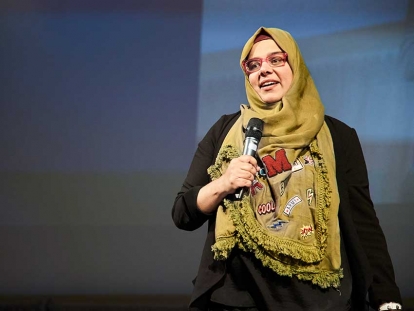 Italian Canadian Nakita Valerio is a community organizer based in Edmonton, Alberta
University of Alberta Alumni Awards
Italian Canadian Nakita Valerio is a community organizer based in Edmonton, Alberta
University of Alberta Alumni Awards
Sep
Nakita Valerio: Bridgebuilding with Indigenous and Jewish Communities
Written by Aicha LasfarItalian Canadian Nakita Valerio is a community organizer based in Edmonton, Alberta, in addition to running her own editing business at “The Drawing Board”.
Nakita is also the Vice President of External Affairs with the Alberta Muslim Public Affairs Council (AMPAC), and works as a historian and researcher for the Tessellate Institute.
The University of Alberta honoured her with a 2018 Alumni Horizon Award on September 24, 2018 for her work interfaith community work.
Muslim Link interviewed Nakita about the many hats she wears and what lead her to become a passionate human rights advocate.
Can you tell us a little bit about yourself?
I was born and raised in Edmonton and for junior high and high school, I went to Victoria School of the Arts; that was an amazing experience. I was into philosophy, history, world religion and politics. I was really into the whole humanities, performing arts and visual arts scene there.
The teachers there were quite open minded and helped foster a sense of social justice in their students. I remember in 8th grade, I had a social studies teacher who had a short lesson on child labour and she ended up condensing the curriculum into 7 months so we could spend the rest of the school year learning about child labour and Craig Kielburger’s organization.
Throughout high school, I had a number of mentors who were justice oriented and they supported me in my interest in studying the Holocaust. When 9-11 happened, they also supported me in having a peace march against the invasion of Afghanistan at a time when very few people were arguing that we should not be invading Afghanistan.
Right from the beginning on January 2002, I was hitting the streets with students with signage we had made, making speeches about how the war there was unjust.
I learned how to do my own press release for that event when I was 15 . I learned a lot about community organizing through my experience in performing arts. When we would have concerts or do art shows, we were also taught behind-the-scenes stuff like how to book the space, how to set everything up and all the logistics.
You mentioned that you had an early interest in studying the Holocaust. Can you tell us more about that?
People always ask me why I was interested in the Holocaust. I think the reason for it is that it’s an accessible period of history to study in terms of genocide. It shows what happens in total social breakdown, and what the end point of racism being realized fully is. It’s accessible because it’s taught in schools and there’s still survivors.
I was just mystified by it…
Looking at people who had ignited their anti-semitism and their hatred, who had previously been good friends with their Jewish neighbours and it’s like, what happened there? There’s something so deep rooted, and it becomes almost like a deeply spiritual question. I can answer the question of how the Holocaust happened, and maybe even why it happened in terms of how the human cognitive mind works. But at the deepest possible level, what does it say? What’s the narrative of human kind here that this is something we’re capable of? What do we have to learn from it?
Can you tell us more about your study of the Holocaust and the impact it had on you?
I visited Auschwitz 5 times before I was 23. That was the beginning of the question and I think it has set me on a lifelong journey. It wasn’t only the Holocaust, I grew up with people around me being deeply racist and I could never understanding that.
It was a pilgrimage for me many times over and just to see the sight and just to see the end point of what hatred gets to…what does the end point of all of this look like? It starts with a pamphlet about your Jewish neighbour and it ends with a gas chamber.
I feel like it’s a continuous antidote to the beginnings of hatred for me. Because you know what leads up to that, you’re more likely to raise the alarm bell when you see it even though other people don’t have a gas chamber within their view.
Human beings are all human beings , yet some people do not grow up with that understanding. It’s not taught to them, they don’t have that innately and they have to learn it and unlearn their oppressive behaviours. I have not been perfect, but there’s always been this kind of thread in my life of being a humanist and being deeply committed to human kind in all its diversity and facets.
When you hear people denying the Holocaust or denying that hateful political rhetoric leads to things like this, the first thing you think of is those gas chambers and you think, “No, I will do anything for it to never to get to that point.” Everything that is a step towards that is a step to oppose.
Can you tell us about the research you presently do with the Tessellate Institute?
I was studying contemporary Jewish responses to anti-Semitism in communities, organizations and individuals across Canada. The point of the paper was to derive potential lessons for Muslims and Muslim advocacy organizations looking to combat anti-Muslim hatred in Canada.
The Institute for Religious and Socio-Political Studies funded the research through Tessellate. This is their first major research study that they’re going to be publishing, so it’s a big honour to catapult them and start what they’re doing.
My masters at the University of Alberta was the study of the Jewish departure from Morocco.
The Tessellate Institute had previously only been studying Muslims in Canada, so they needed somebody who was literate in both discursive formations and I happened to be the right person for that.
Can you explain for us why it was important for you to research responses to anti-Semitism?
People ask why we’re even looking to what they [Jews] do, and it’s a legitimate question that I address in the article. I don’t want to say that anti-Semitism and anti-Muslim hatred are equal. They’re not identical, but they do fall under the greater banner of racism. I think it’s worth studying what Jewish responses are because, just looking around Canada since the late 19th century, they’re much more established organizationally than a lot of other marginalized communities. They also provide a unique perspective because they often come from minority context back into a minority context here [in Canada].
Jews who are immigrating from Europe are a minority in Europe and they have organized as minorities there for centuries. They then come into the Canadian context with that organizational background. Whereas Muslims who are immigrating here are coming from majority contexts where they didn’t need to understand what it was like to be a minority in their home country necessarily.
That’s not to say everyone, of course we have Ismaili refugees and other groups who have come here as minorities within minorities. Generally speaking, that is much more prevalent for Jewish communities, and that’s why it’s recommended to study with them. It’s a form of religious hatred that’s racialized, so it has some similarities and consistencies with anti-Muslim hatred as well.
You have led many educational talks and seminars about Islam and Islamophobia to different organizations. Can you tell us more about the work you do with AMPAC?
My goal is for people to understand how their organizations either engender or confront racism with regards to how they treat people and the economic and systemic barriers that are a result of their racialization.
The important thing to keep in mind is that there is a plethora of responses that any raciallized community can take to confronting racism. Within the organization of AMPAC we have several ways of responding. We have an Islamophobia hotline set up where people can call and report incidents in public but also in their workplace and that sort of thing. it’s a great buffer for racialized people who do not want to deal with law enforcement, so we will be the go-between.
We also do representation work. In terms of communications, we have our Muslims of Alberta campaign which is a “Humans of New York” kind of thing but it’s telling stories of Muslims in Alberta. We have proactive work with journalists to cover positive Muslim stories and also to reach out to us first when it comes to media responses. Developing those relationships with media is super important.
We do have response events, so like when the shooting happened in Quebec - the terrorist attack that happened at the mosque - we organized a vigil where 2000 people came out and it was just an opportunity for some communal grieving to happen and for us to mark the gravity of that situation.
What I do is really just one type of response . I’m not saying that what we do is going to solve the racism puzzle, but it’s working towards something. it’s working in a way, like listening to members of racialized communities who have said these are some of the ways in which we think it could work, and also think of what not do to.
[For example] we do not offer these types of training certificates so people can just pat themselves on the back and say, “I’m not being racist.”
In addition to your work within Canada, you have also contributed to the building of a school in Morocco. Can you tell us about that?
In 2010 after I converted to Islam, I went on a trip to Italy to see the homeland and I met my husband who was there for 12 years. He asked me what I wanted to do with my life and I told him I was really interested in working in Muslim women’s literacy somewhere in the Islamic world. He said, “perfect I’m building a school in Morocco!”
The school is in rural Morocco and we’ve had some troubles for authorization because of corruption there, but our goal has been to make it a space of learning for women. In February 2011, I saw the school, met his family and we committed to being married. In September, I moved there and we opened the school.
At that time I was there for 8 months and I was the director of the school and an English teacher. I came back to Canada in 2012 and did a giant fundraiser called “Artists for Literacy” and we made enough money to buy our school bus and build the third level of the school.
I remained in Morocco for 2 years.
Is there a connection between your time spent in Morocco and your decision to study the Jewish Departure from Morocco?
It was when I started my masters at the University of Alberta in Moroccan history that I became more interested in the Jewish story. The reason for that was because, when talking about the departure of Jews from Morocco, almost every historian doesn’t talk about the Holocaust as the backdrop to that immigration or departure. I was just interested in why that was the case and why they aren't talking about it.
It sort of evolved as you do your research of course, as any topic does.
You are also involved with the Young Indigenous Women’s Circle of Leadership. Can you tell us more about how you came to volunteer with them?
In 2016, the Edmonton Journal ran an article about how they had lost their funding and so I just contacted them and said, “How can I help?”. A couple of other people did that as well, and so we formed a fundraising board. I stayed with them for a couple of years now and we’ve managed the last 2 years to get funding to run their camp.
It’s a culturally and linguistically immersive camp where they speak Cree, it’s an amazing camp.
What advice would you give to your fellow Muslim Canadians about building bridges with their local Indigenous communities?
First of all, I’m no expert, but what I usually tell people to do is what I would want them to do in terms of helping out Muslims, which is to listen and learn first.
That sounds kind of obvious, but it’s so crucial. I would say one must understand and recognize that the first step is knowledge. They always say, “Truth first, then reconciliation.” Learning is absolutely the first step that people have to take in that journey, and I recognize that in myself too that I have a long way to go. I spent 2017 reading the entire 6 volumes of the Truth and Reconciliation Commission Report. We had a reading group through AMPAC and we made a commitment to meet monthly and discuss the volumes that we were studying. We made it through the whole report and that in it of itself was massively illuminating.
We don’t want learning about indigenous cultural groups to only be learning about the genocide that they have endured and survived on this land, but at the same time as settler immigrants, it is our obligation to learn what that genocide looked like and to bear witness to it before we try to enter spaces in order to be in solidarity with people.
The other thing too is that people will talk a lot in very harmful ways about what Indigenous people think about this or that. I like to remind people that these groups are very diverse and often contradictory. I think one of the biggest things settler immigrants can do is learn that there is that nuance and complexity.
When I do my talks about Islam, all I’m talking about is the concept of difference of interpretation. I think that’s the first step. After that, it’s getting to know and meet people and making spaces. If you want to build solidarity, makes spaces for Indigenous stories to be taught and told.
That kind of thing is really important and a great way to build alliances and build friendships and get to know people. Also, just attending and bearing witness and enjoying people’s cultures in a way that’s not appropriative and in a way that honours people and dignifies the history that they have on this land is huge. People will be like, “That doesn’t seem like a very big thing to go to a Sundance…” but it is a huge thing because that sort of thing was previously banned and is still not viewed as a legitimate cultural tradition by most of Canada.
To honour treaty means being committed to friendship and friendship means we’re committed to the socio-economic success of one another, the cultural success of one another.
Finally, what advice would you give to people who want to become more present and active in their communities and contribute in some way or another?
I would say the first thing is to start by attending what already exists, get to know people.
It becomes readily apparent who the community organizers are. I started out by just going to various things and you start to see the same people over and over again in an organizational capacity and you can get to know them.
A lot of people want to get involved, and they want to get involved ego wise without actually showing up and doing the work. It’s a huge amount of work. So show up, and once you find people that you resonate with and you like how they do things, offer your time, offer your labour, why not volunteer? You’ll start to get a taste of what it’s like to community organize and you can go from there.
Know too that not everything is going to resonate with you. You might go to something and realize it’s not your crowd and that you don’t like their worldview. Just because it’s community organizing doesn’t mean that it’s good or just.
This article was produced exclusively for Muslim Link and should not be copied without prior permission from the site. For permission, please write to info@muslimlink.ca.















